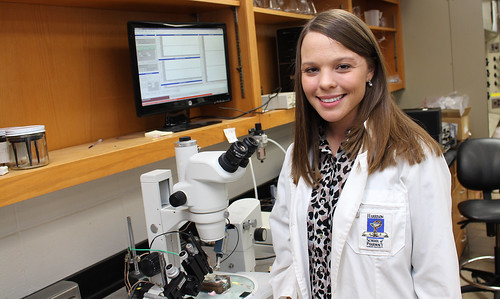Pharmacy student presents impact of fat cell-produced protein on diabetes patients at Boshell Research Day
Article body
In 2012, Jenna Bloemer picked up her white coat, crossed the stage and shook hands with Dean Lee Evans, signifying her induction into the Harrison School of Pharmacy at Auburn University.
Now, nearly four years later, while her classmates are preparing for graduation in May, Bloemer is just reaching the halfway point in her pharmacy education.
Bloemer, an Athens, Alabama, native, is the first Auburn student to enter the pharmacy school's Pharm.D/Ph.D. dual-degree program. While pursuing a Doctor of Pharmacy degree, or Pharm.D., the last four years, she has been conducting research in the lab of Vishnu Suppiramaniam in the Department of Drug Discovery and Development. Bloemer will receive her Pharm.D. in May and continue working under Suppiramaniam while completing the requirements for a Ph.D.
This was not always her intention though. When Bloemer started pharmacy school, she was just interested in helping conduct research.
"I originally became interested in working with Dr. Vishnu after hearing him lecture on the central nervous system my first year of pharmacy school," she said. "His passion for research was evident, and his enthusiasm was contagious. When I approached him about research, he eagerly welcomed me into the lab."
Just months later, Bloemer was presented with a new opportunity from David Riese, the school's associate dean for research and graduate programs.
"I had talked to some of the faculty about my interest in research, and it just so happened that at the same time, Dr. Riese had been working on developing a protocol for a dual program," Bloemer explained. "When he contacted me to see whether I would be interested, I was thrilled and jumped on the opportunity to become the first Pharm.D./Ph.D. student."
While working in Suppiramaniam's lab, Bloemer has had the opportunity to assist with research on the mechanisms of memory deficits in Alzheimer's disease, diabetes and chemotherapy induced memory loss, or chemo brain, as well as development of novel therapies for these conditions.
Recently, Bloemer has studied adiponectin, a hormone that is produced by fat cells. She presented on this protein at the Boshell Research Day on Feb. 26, discussing how it impacts diabetes patients and memory deficits.
The Boshell Diabetes and Metabolic Diseases Research Program, based in the College of Veterinary Medicine, is a research initiative that seeks to better understand and treat diabetes and metabolic diseases by uniting the efforts of researchers across the university. More than 40 faculty members at Auburn are part of the program.
"We are discovering more and more that fat cells have endocrine functions that profoundly affect the rest of the body, including the brain," said Bloemer. "As we further dissect the effects of adiponectin, we can better understand its role in the body and explore novel mechanisms for development of cognitive disorders."
Plasma levels of adiponectin are inversely proportional to body fat percentage, and a number of animal studies show that absence of adiponectin increases insulin resistance and impairs normal glucose metabolism leading to diabetes. If diabetes patients have lower levels of adiponectin, Bloemer said she believes it could make them more susceptible to dementia and Alzheimer's.
"Adiponectin has an important role in glucose metabolism and works as an insulin sensitizer," she said. "Dr. Vishnu's lab has previously shown that glucose metabolism is disturbed in the brain at the onset of dementia and other cognitive disorders. So we have hypothesized that adiponectin could play a protective role in the brain and could potentially help to prevent dementia."
Research has been conducted using mice that do not produce any adiponectin. Bloemer has used these mice to study any cognitive issues that may arise because of the lack of the hormone.
"The results so far have been promising, and we have seen that these mice not only show cognitive deficits on behavioral tests, but also have impaired communication between neurons in the brain," said Bloemer.
The opportunity to participate in the dual-degree program has been exciting for Bloemer, who now sees her career taking her into academia so she can continue to conduct research while also remaining involved in the clinical side of pharmacy.
"I really enjoy the university environment and I also enjoy ambulatory care pharmacy and having meaningful interactions with patients," she said. "I think that academia may be ideal for my interests because it often allows for a combination of multiple aspects of pharmacy.
"I think that the number one thing research has taught me is to think outside of the box when problem solving. In research, it often happens that either the experiment doesn't work correctly or the results received are not at all what were expected. This concept carries over to patient care because each individual is different and one single approach will not work for everyone."
Related Media
Media interested in this story can contact Communications Director Preston Sparks at (334) 844-9999 or preston.sparks@auburn.edu.
Auburn University is a nationally ranked land grant institution recognized for its commitment to world-class scholarship, interdisciplinary research with an elite, top-tier Carnegie R1 classification, life-changing outreach with Carnegie’s Community Engagement designation and an undergraduate education experience second to none. Auburn is home to more than 30,000 students, and its faculty and research partners collaborate to develop and deliver meaningful scholarship, science and technology-based advancements that meet pressing regional, national and global needs. Auburn’s commitment to active student engagement, professional success and public/private partnership drives a growing reputation for outreach and extension that delivers broad economic, health and societal impact.





